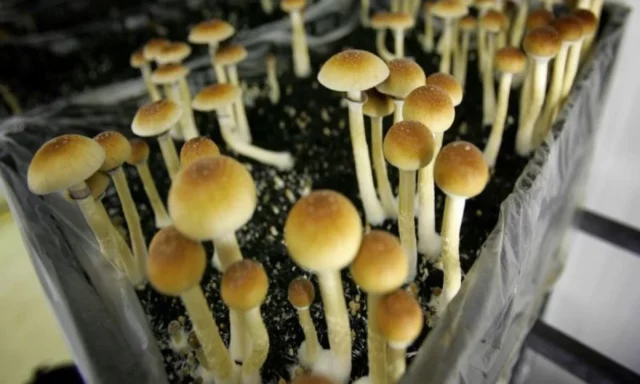For thousands of years, indigenous peoples have obtained their ancestral medicines from nature. Far from laboratories and chemicals, the answer towards many ailments lies in plants and fungi found in different ecosystems.
This is demonstrated by the scientific research that has been advancing throughout the world in recent decades around substances such as psilocybin -the main compound of the so-called “magic mushrooms”- some 200 species of fungus naturally contain this compound. This psychoactive substance, according to recent research, helps –together with support psychotherapy– to treat diseases such as depression, social anxiety, anorexia nervosa, post-traumatic stress or different types of addictions such as alcoholism.
According to the World Health Organization (WHO), more than 300 million people worldwide suffer from depression and only 30% of these are served by antidepressant drugs that exist on the legal market. Despite the fact that its medical benefits are increasingly well known and proven, the stigmas surrounding psychoactive therapies remain in legal limbo, psilocybin is illegal in most countries of the world, and researchers and doctors face multiple barriers for the treatment of this type of patients with these substances that act on the central nervous system, modifying the state of consciousness and behavior.
To develop this topic we spoke with Pablo Zuleta, doctor, psychiatrist and director of the Area of Consumption and Drugs at the Universidad de Los Andes.
How does psilocybin act in our brain?
Pablo Zuleta (P.Z.): Psilocybin is a substance known as a serotonergic agonist. There are several types of these that act in different brain areas, the one that ends up having the greatest impact in the case of psilocybin and other similar hallucinogens is the occipital areas and they have a fairly complex integration at the level of the thalamus; where all the experience of perceptual changes is generated where fundamentally in most cases there is no loss of criticism.
The individual has, in the case of its use, a navigation experience -let’s say a “journey” as they are popularly called- where a large number of modifications arise in the perceptual structures, let’s say in the objects they are altered and another type also appears mainly visual objects. At the same time, another element that is important is that the way in which the information is stored as it is possible to have an evocation of the memory of the episode of the “trip” as such is not very precise. They have some important aspects in that the narration is also part of an individual construction about what is experienced.
A study was published this week pointing out how this compound in psychedelic mushrooms helped alcoholics reduce or completely stop consuming alcohol.
What does this type of study consist of and how does psilocybin work in patients with addictions?
P.Z.: These studies are novel. We are venturing into a topic that had not been explored before in the way it is currently happening; that is with controlled clinical studies under observation. Although we have some important advances both in the promising aspects of depression and certain aspects of what can become different forms of addiction, we still have a long way to go.
It is a therapeutic proposal, that is, an interaction with a psychotherapist that accompanies, not only the moment of intoxication, which in many cases uses doses that do not have the expectation of generating hallucinations, the “trip” as such, but precisely that serotonergic stimulation that we are talking about, what has been assumed is that these changes in brain structures modify the production of serotonin that in many cases is linked to different types of findings that we have in addictions; both with elements of a depressive nature and explosive or repetitive behaviors with memories that have to do with inadequate emotional reactivity, and these types of elements change you to the extent that you have this type of stimulus.

What are the risks of stigmatizing these substances for their medical application and scientific research?
P.Z: We have a historical problem since the 1970s, closely associated with the declaration of the war on drugs. There was a political movement that prohibited research mainly in the United States on these types of drugs. In that case, phyto-therapeutics was being used and was deeply rooted in certain academic groups that were advancing research. From then until now, until very recently, we did not have any kind of progress, but stagnation and what happened in general was a recreational use of mushrooms.
Mushrooms in themselves do not have a significant risk of problematic consumption, psilocybin, that type of serotonergic agonists where there are other types of substances, have periodic type consumption. That is to say, from time to time, people who are interested in this type of drunkenness do so; monthly or with very low frequency weekly uses.
Mainly, its uses are occasional because they do not generate that need or desire for compulsive and frequent consumption. Therefore, that is what we saw for a long time, that society in general, the different cultures, began to use it in that traditional way that was originally seen in Mexico.
We could say that in the last 10 years there has been a lot of progress in research. Once the legal possibility to do the research is opened, but we still have a lot of limitations on the research that is done in different places. For example, in Colombia we do not have availability of psilocybin that is validated by State entities and at the same time there are not very clear uses of microdoses through the production of mushrooms, but these mushrooms do not have any type of certainty, of what is what they contain or what the benefits they may have are.
This means that, although there is the possibility of treatment, not only of addictions, but also of depression, we do not have the possibility of doing research and advancing in the medical uses of people who really need it.

